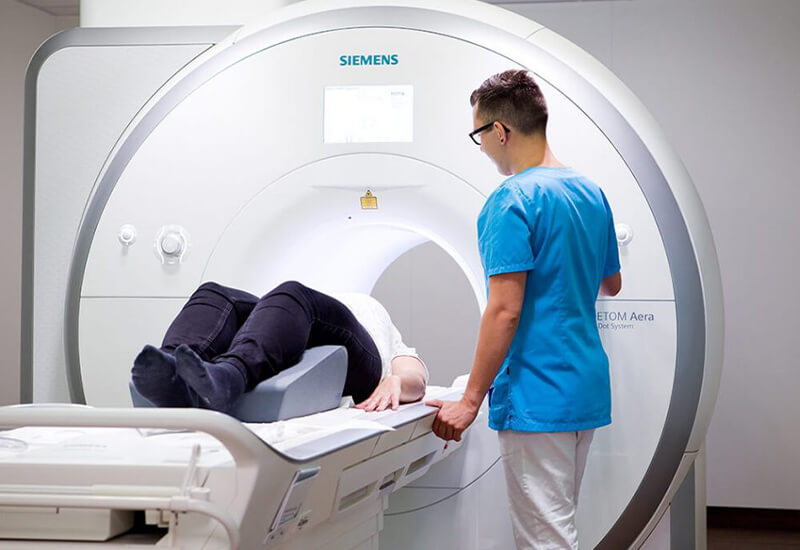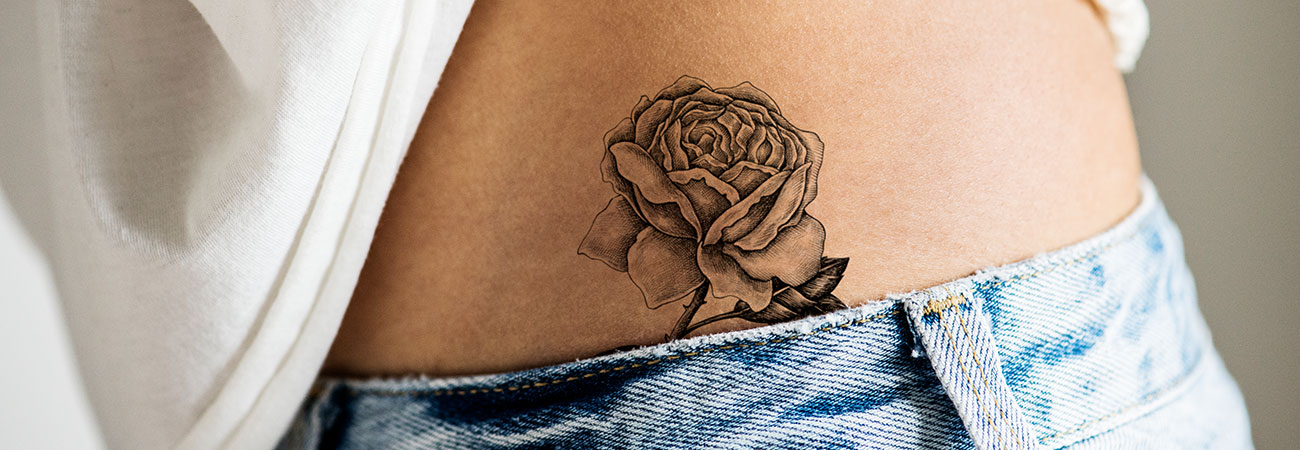Since an MRI is a diagnostic procedure based on a strong magnetic field, many patients ask themselves the questions: “Can I have an MRI with a tattoo? Is any damage to my body or the tattoo to be expected? And how will my tattoo affect the results of the exam?” We answer these questions in this blog article.
MRI can be done with tattoo
In principle, magnetic resonance imaging can be done on people who have tattoos without any problems. However, to be on the safe side, some aspects should be discussed with the registration at the private radiology practice of Dr. Catarina Jung before the examination.
Tattoo colors used
It is important that you inform us about the ingredients of your tattoo inks. Older tattoos (before 1990) may have been stitched with inks containing magnetically active ingredients (e.g. iron carbonates, iron hydroxide, iron oxide). In Germany, inks have been used since the 1990s that generally contain few to no magnetic ingredients and are therefore suitable for MRI. However, the use of magnetically active substances is not prohibited. Thus, magnetic substances may still be present in certain inks – albeit in very small amounts: These include iron hydroxide and iron carbonate in white, iron oxide in red, and iron ammonium ferrocyanide in blue. Therefore, in rare cases, they colors red, white and black can cause problems during MRI examination.
Localization and size of the tattoo
Furthermore, the location of your tattoo and its size may possibly limit the success of the MRI examination. Tattoos that are located in the area of the body part to be examined can in certain cases lead to interference with the imaging. Similarly, tattoos that are particularly large and located in the area of the body part to be examined may also interfere with imaging. Accordingly, tattoos that are located on a completely different area of the body are completely unproblematic. This means that, for example, a decorative image on the upper arm will not limit MRI at all if it is performed on the knee.
MRI does not damage the tattoo (exception: freshly stitched tattoos)
If you need to have an MRI scan, you do not need to worry that it will affect the look and texture of your tattoo: MRI is not harmful to your tattoo. There are no consequences or negative effects to worry about.
However, caution is advised for newly inked tattoos. During the first six weeks after the “due date” – if possible – an MRI examination should be avoided. During tattooing, superficial cells of the skin and cell-to-cell contact are temporarily damaged or impaired. Therefore, freshly stung colors may possibly fade due to the magnetic field.
Risk of skin burns in persons with tattoo in MRI?
Theoretically, superficial first-degree burns of the skin may occur due to the alignment of magnetic ingredients of the tattoos during the MRI examination. However, this is extremely rare.
To prevent this from happening, we give the patient a push button in his hand during the examination. He can press this button at any time if he feels a warming. This stops the examination. A burn usually does not develop immediately, but the patient can feel it. In this way, he can react in time if the case arises.

Study on tattoos in MRI: Only 2 of 330 subjects with tattoos had side effects
In a study conducted by Nikolaus Weiskopf (now director at the Max Planck Institute for Human Cognitive and Brain Sciences in Leipzig) and his London-based colleague Martina Callaghan, the focus was on whether tattoos are dangerous on MRI. The study was conducted over several years, and the results were published in the New England Journal of Medicine in early 2019.
The study involved 330 people who had a total of 932 tattoos. Excluded from the study were patients whose individual tattoos were longer than 20 cm and where more than five percent of the body surface was covered with the images. Furthermore, subjects who had tattoos on their head, neck and/or genitals were not allowed to participate in the study. This, of course, limits the validity of the study, but the scientists wanted to play it safe.
Before pushing the patients into the MRI tube, the research team recorded exactly how big each tattoo was, where they were located, what colors were used and which country the body art came from. The patients were then examined using powerful MRI machines of three Tesla. This is a power level used in many clinics (for comparison, the equipment in our MRI practice in Frankfurt works with a 1.5 Tesla high-field system).
The result: only two of the 330 test subjects with tattoos showed side effects. One reported a slight tingling sensation, the other noticed warming and a feeling of tension, whereupon the examination was discontinued. The patient recovered within a day with no signs of burning.
The research team explains this effect by the high-frequency field used in MRI to generate the images. Usually, this has a frequency of a few hundred megahertz. This achieves resonance lengths of conductive structures that also roughly correspond to the length of a tattoo. Here, the tattoo can absorb much of the energy from this high frequency field, which would normally be spread out over a wider area.
Nevertheless, the majority of the tattooed subjects did not experience any side effects in the MRI. The undesirable side effects that affected two subjects are to be considered isolated cases.
MRI Frankfurt
Conclusion: In most cases, an MRI can also be performed on persons with tattoos without side effects or restrictions. However, please talk to us about your tattoo before the examination.
We are considered a specialist practice for radiology in Frankfurt and offer state-of-the-art technology. The MRI machine we use for the examination has a tube diameter of 70 cm. Thus is much wider than usual devices. MoodLight lighting and individual music of your choice provide a pleasant atmosphere during the examination.
Titelbild: elements.envato.com | © Rawpixel
Dear patients, you can book your desired appointment for an MRI examination at our practice in Frankfurt am Main easily and conveniently online at any time, even outside consultation hours. Benefit from flexible appointment times and book your appointment in just a few seconds.
